By Li Chi
Translated by Yang Hsien-yi and Gladys Yang
Originally published by Foreign Languages Press (Beijing, 1964)
Reprinted online by the MCLC Resource Center, 2003.
PART TWO
The Revolution
No trees and few stones had Sanpien,
The peasants’ lot was bitter then.
No clouds above, below a drought,
They had to think of some way out.
With scarlet banner at their head,
Through North Shensi the army spread.
With Liu Chih-tan to lead them, high [1]
They raised the Red flag to the sky.
From sparks in hay big fires can spread,
The Red flag made all poor men Red.
The lightning’s seen for miles around,
And communism soon gained ground.
Gladly the plough a roan ox draws,
All folk support a people’s cause.
Plain peasants by the broad daylight
Become armed soldiery at night.
Open the forts, divide the lands,
Cattle and grain to the people’s hands!
Youth Corps and Red Guards grow apace,
There lads of eighteen find a place;
And girls run out as swift as wind
Their long hair cut in bobs behind.
A stream in spate will burst its banks:
By stealth Wang joined the Red Guards’ ranks.
He grazed his herds when day was bright,
And off to meetings went at night.
There he remained until cocks crowed,
Then sped back down the homeward road.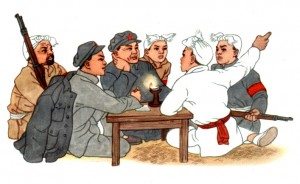
During the day his goats he’d keep:
During the night no wink of sleep.
Tired as he was, his spirits high,
For revolution glad to die!
Five fingers are of different length,
His hate surpassed the rest in strength;
Though others’ hate was mountain high,
That of Wang Kuei otertopped the sky.
Tsui flogged his father till he died, I 981
And now he wished to steal Wang’s bride.
Five years young Wang had toiled away,
Without a cent from Landlord Tsui.
Nothing too vile for Tsui to do,
He built forts, hired soldiers too.
Landlords were vicious, every one,
But Tsui had all the rest outdone!
Folks longed to tear him limb from limb;
The very dogs would bark at him.
“Oh, may the Reds come soon!” they’d pray.
“Make haste to capture Dead Goat Bay!”
Though beans are raw, starved folk can’t wait;
Can the Sun Rise in the Western Sky?
A fox-hunt frightens hares away,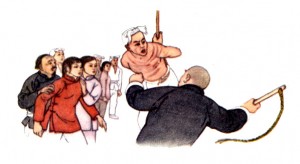
Red revolution frightened Tsui.
No sleep for him; he tried too late
To hold back all the river’s spate.
He sought by spies, by guile, by twists,
To find who backed the Communists.
The news that Wang was underground
Made his black heart with anger pound.
They laid in wait for Wang that night;
With two thick ropes they bound him tight.
The landlord had him trussed and slung,
Then from the rafter he was hung.
The villagers were summoned straight,
To see “a dirty rebel’s” fate.
Two canes they broke upon Wang Kuei,
Revived him when he swooned away.
When oil is burnt, bright light is made;
His clothes were from his body flayed.
They trussed him up from throat to thigh,
And left his body dangling high.
Blood flowed from every cruel gash,
Flailed like an ox beneath the lash.
With fury Tsui seemed like to choke
He swore at Wang between each stroke:
“You frogs that want to feed on cranes
Won’t gain your ends for all your pains.
Look at your face in a puddle, do!
What can be done by curs like you?
Can the snow fall in mid-July?
The sun rise in the western sky?”
“No need, old dog, to strut about;
The wind will blow your lantern out.
Death matters nothing in my case,
For millions more will take my place.”
“Be reasonable, Wang! Don’t bawl!
Are we not kinsfolk after all?
What wrong to you, pray, have I done?
I brought you up as my own son.
You smash the bridge, the river crossed;
Your feathers grown, your thanks are lost.
A horse may be a dragon yet;
Are you so stupid to forget?
A prodigal’s worth more than gold,
And butchers can be gods, we’re told.
Wipe the slate clean—that’s my desire;
Young fellows always play with fire.”
“No good, old turtle, turning sweet;
This customer is hard to cheat.
In all the world’s no greater knave;
You killed my dad, made me a slave.
The whole year round I sweat away,
But in five years I’ve had no pay.
Even beasts munch hay at dead of night,
You woke me, shivering, out of spite.
No clothes, no bedding in the cold,
In five years just two sheepskins old.
You ate and swilled throughout the year;
Husks were the most I had as cheer.
A friendly word you’d never say,
But whipped me every other day;
Parents you had to care for you,
D’you think I had no mother too?
We both are human, you and me,
But you show no humanity.
I may be poor, but I’m not blind;
It’s easy to make up my mind.
If we succeed, I shall be strong;
Without a fight, I shan’t live long.
The meanest, tortured beast must strive,
And I’ll fight on while I’m alive.
What’s stopping you from killing me?
I know the devil you can be.
I’ll never bow to you again!
Your bribes are just a waste of breath;
To me your yoke is worse than death!”
Tsui’s loss of face was so complete,
Like some mad dog he jumped three feet.
“You dirty bastard, so perverse!
Kind words can only make you curse!”
Once more whips showered blows like rain,
And Wang Kuei clenched his teeth with pain.
A gust of wind, a gust of sand,
No more of this could Hsiang-hsiang stand;
She trembled, weak in every limb,
Stunned by the blows that fell on him.
Her face turned white and then turned red,
Tears dimmed her eyes she dared not shed;
Her head was swimming, numb she’d grown,
Like a live creature turned to stone.
To save Wang Kuei she found a plan,
Out of the gate by stealth she ran,
Thinking as she sped away:
“Wang may not last another day.
He went to meetings at Liu Fair,
There’ll surely be guerrillas there.
They must be quickly told the news,
Unless they come, my love I’ll lose!”
The Red Flag Is Planted in Dead Goat Bay
Loud on his whistle the sergeant blew,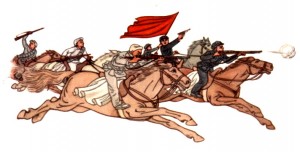
To fetch guns, horses, each man flew.
When news came in of Wang Kuei’s plight,
The word went round at dead of night:
“A loyal comrade is Wang Kuei,
His life must not be thrown away.”
The Red Guards and the Youth Corps sped
With twenty horsemen at their head,
Their rifles on their shoulders slung,
Cloppety-clop! the horse hooves rung.
With steeds so swift, men so stout-hearted,
Before the dawn the fight had started.
A single root have turnips white:
Peasants and partisans unite;
When shots are heard then out they run,
With hatchet, stick or rusty gun.
Together now they pound away;
Red flags have come to Dead Goat Bay!
Shots sounded, dogs barked, roosters crowed,
As in our brave guerrillas rode.
The landlord, sound asleep in bed,
On hearing shots leapt up in dread;
His anger spent upon Wang Kuei,
An opium pipe had made him gay.
But this was not enough, alas!
Nor his bronze lamp with shade of glass,
Of all his women gathered there,
Not one with Hsiang-hsiang could compare.
Some throw fat mutton to a cur,
Yet Tsui had failed to capture her.
“Wang Kuei will soon be dead,” said he.
“And then the girl will come to me.”
So sugar-sweet this dream appeared,
He dribbled down his ugly beard.
And dreamt, the lamp beside him placed,
Of Hsiang-hsiang in his arms embraced.
But not for long did this dream last,
Bang! Bang! the gun shots rang out fast.
Awoken by the first loud bang,
At the next one up he sprang.
And called his henchmen in a flurry:
“Lock up, and climb the roof!
Now hurry! Each man you spot, just shoot him dead!
I’ll pay ten silver yuan a head!”
But more men came, shot followed shot
The landlord found the place too hot.
Before the sun rose bright that day
Through the back gate he slipped away.
And, by the time of noonday heat,
Red flags waved in the village street
Like a great blossom blazed the sun,
Guerrillas, peasants cheered as one.
“Here’s thick rice porridge, bubbling hot.”
They fed the Red Guards on the spot;
And Wang Kuei’s ropes were soon untied
But at the sight of him they cried
The pain had made him faint away,
Loud Hsiang-hsiang wept and called Wang Kuei.
“If you die, I die too,” she cries.
“Look at me, dearest! Open your eyes !”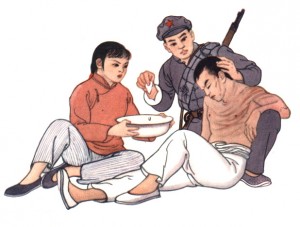
Free Marriage
The earth is red beneath the sun’s warm gaze,
And revolution has brought better days.
Under old Landlord Tsui all things were black;
Nine out of ten had no clothes to their back.
The poor rose up to drive out Landlord Tsui,
And Dead Goat Bay became their Live Goat Bay.
When lamps lack oil, they can but feebly glow;
When men lack land, the spark of life burns low.
The land once theirs, light shines in every place,
And smiles of pleasure beam on every face;
Then bitter gentian turns to sugar sweet.
Wang Kuei and Hsiang-hsiang wed, their joy complete.
Women and men are equal now and free,
Freedom of choice in marriage now we see.
Like the poor pilgrim in the days of old,
The two had suffered miseries untold,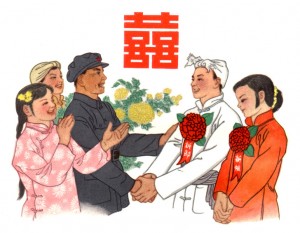
But through a thousand woes did not despair;
Heaven it is to see a well-matched pair!
A bird will sing as to its nest it flies,
Now tears of happiness dim Hsiang-hsiang’s eyes.
As from the fountain head the water flows,
Salt tears are falling on Wang Kuei’s new clothes.
“I tossed and turned all night, time seemed so slow,”
Said Wang. “I thought the cock would never crow!”
And Hsiang-hsiang’s tempted both to laugh and cry;
She cannot say a word, she feels too shy.
Then Wang Kuei, bashful too, becomes tongue-tied,
Thinking of Hsiang-hsiang as his own dear bride.
Speechless they stand, her hands in his held fast,
Until his thoughts find vent in words at last:
“By revolution are the rich o’erthrown,
By revolution you become my own.
‘Twas revolution that saved you and me,
‘Twas revolution made us peasants free.
The Red flag gleams: we’ll guard it, every one.
If it should fall, then future have we none.
Quickly let horses speed and oxen plough;
To spread the tidings is our duty now.
The earth is slippery after heavy rain;
But if we stumble, we can rise again.
Now smiles the sun so red and gay on high;
I’m with the revolution till I die!”
Three happy days they spent as wife and man,
Then Wang enlisted as a partisan;
For coolness wrapped a towel around his head,
Shouldered his rifle, and away he sped.
Each week or fortnight, when of duty free,
He’d ask for leave, his young wife for to see.
She would not leave him till they’d reached the glen,
Mud rich and brown deep in the valley lay.
“Come, let us make two figures out of clay.
Make one of you and also one of me,
Make them as true to life as they can be.
Then break and mix the clay to make anew
Two figures, one of me and one of you.
Then there will be some trace of you in me,
And something of me, too, in you there’ll be.”
When that was finished, Wang Kuei had to go
“Come back, my dearest, in a day or so.”
1. *Liu Chih-tan, organizer and leader of the Communist Party and the Red Army in North Shensi during the Second Revolutionary Civil War (1927-1936). In 1936, he fell in battle while resisting the Kuumintang forces who were attempting to prevent the Red Army from fighting the Japanese aggressors